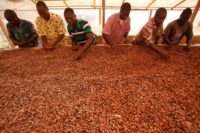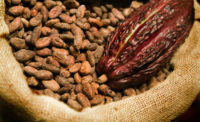All Ritter Sport products leaving Alfred Ritter GmbH & Co. KG’s Waldenbuch, Germany, production site use chocolate that has been cultivated and processed under sustainable conditions, the company revealed Jan. 26.
As a result, Ritter has become the first major chocolate bar manufacturer to switch to sourcing certified sustainable cocoa for its entire assortment.
“Our mission is to produce truly good chocolate,” says Andreas Ronken, ceo at Alfred Ritter GmbH & Co. KG. “That applies not just to our uncompromising philosophy of quality, but particularly to ecological and social relations along the entire value chain, and consequently above all in the cultivation of cacao. Ritter Sport is synonymous with enjoyment, and in our times, true enjoyment means not wanting it at the expense of others.”
As Ronken emphasizes, the switch to 100 percent certified sustainably sourced cocoa is a milestone for the company, and for the entire industry. Current statistics show that the amount of sustainably sourced cocoa used in confectionery and sold in Germany has reached 45 percent.
The announcement means that this traditional family-owned business, which received the German Sustainability Award at the end of last year, has achieved the most important target in its sustainability strategy much earlier than originally expected.
Apart from the improved assortment of products in the global market, Ritter attributes its fast-track transition to exclusively certified sustainable cocoa to its own direct sourcing strategy. The company has been successfully implementing this strategy in Nicaragua for almost 30 years.
In the meantime, in collaboration with various partners, Ritter has been able to establish direct supply contacts with farmers and cooperatives in other regions of the world as well.
Switching entirely to certified sustainably sourced cocoa was the first important milestone along the way to achieving the greatest possible transparency, spokesperson Thomas Seeger explains. The company will continue to develop its cocoa-sourcing strategy and expand its direct supplies.
Furthermore, its own plantation, El Cacao, is geared to supply around 30 percent of the cocoa mass the company requires, he adds. Overall, the company invests nearly €11 million annually in sourcing sustainable cocoa.
Separately, Ritter has recorded growth not just on its company-owned cacao plantation, but most significantly, also in its international business. Although sales within the German chocolate bar market declined slightly in 2017, the strength of the export business —12 percent growth — contributed to the company’s total growth of almost 2.5 percent.
For 2017, Ritter anticipates total revenue at €482 million euros; sales reached €470 million in 2016. As mentioned, the Ritter Sport brand lost ground slightly in the highly competitive 100-gram chocolate bar market in Germany.
Sales in 2017 based on IRI figures accounted for 21.9 percent of the market versus 22.6 percent in 2016, while volume in 2017 accounted for 20.6 percent of the market versus 21.6 percent in 2016.
Excluding the share of hard discounts, whose promotional pricing had a significant influence on the share of the market in Germany, Ritter has achieved a 0.5 percent gain in the food retail industry. The company was also able to report a very positive development in the travel retail business.
The company sees itself well positioned for 2018 as it looks to launch a significant number of new products, which will spur further growth for the coming year, Seeger says.





